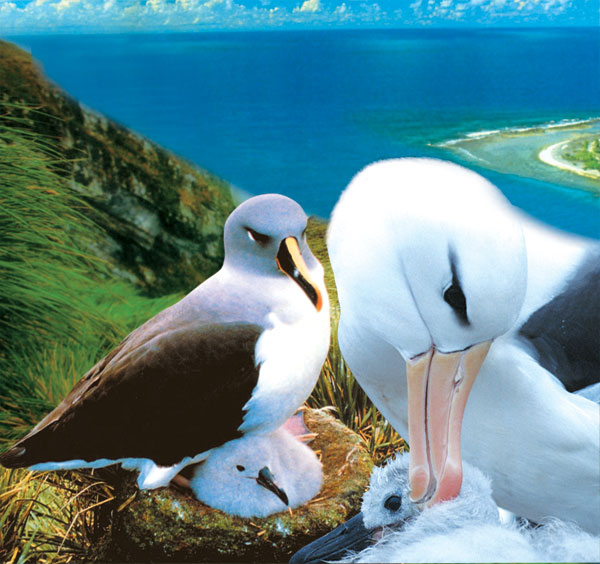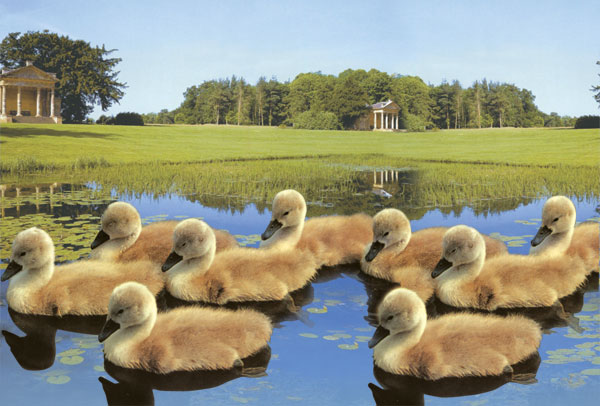The Wondrous Beauty in Animals 3/4
Wolves are thought of as one of the most savage animals in the natural world, yet both parents look after their babies together. A basic wolf pack comprises an alpha male, a female, newborn cubs and sometimes one or two young wolves. Females in the pack assist each other. Sometimes, one will stay in the den all night to look after the pups, which allows their mothers to go hunting.
This mutual assistance among wolves shows the self-sacrifice of which animals are capable and gives the lie to evolutionists who claim that animals are merely selfish.
A hummingbird's nest is about half the size of a golf ball, but one of its most striking features is that as the babies grow, the nest expands automatically. This is because the parent hummers weave together tree bark, moss and plant stems with very strong, pliable spiders' webs. How can these tiny birds know to choose such an ideally useful material for the construction of their nests? Like every creature on Earth, hummingbirds act by Allah's inspiration and, with this intelligence and foresight given by Allah, are able to make their babies comfortable.
 |
He is Allah--the Creator, the Maker, the Giver of Form… |
When most baby birds hatch, they are blind and lack feathers. Mother birds must attend to their fledglings' every need. Even after they leave the nest, their mothers typically follow them to make sure that they can fend for themselves. Our Lord protects and looks after all His creatures; it is He Who inspires the hummingbird with intelligent forethought to build nests that can stretch and expand; and gives other species a sense of responsibility toward its young.
Ocean terns build their nests in communal groups on islands surrounded by water, but even so, these nests are not completely safe. They can be easily reached by the winged thieves. Building their nests beside those of their neighbors affords the terns protection from danger from above. Staying apart from everyone else lets a predator focus all its attention on you, but being immersed in a group means that you have less probability of being singled out for attack. Besides, neighboring birds can assist in driving away an attacker. Birds arrange their nesting colonies as if they knew this. Allah looks after and protects every living creature.25
The albatross has the widest wingspan of all birds, reaching 3.5 meters (11.5 feet). These birds take characteristically great care in building nests to protect their eggs and their young. During the mating season, they gather together in colonies—but weeks before the females come, the males arrive to repair already-existing nests.
 |
Everything in the heavens and everything on the Earth and everything in between them and everything under the ground belongs to Him. |
Albatrosses sit on the eggs in their well-prepared nests for 50 days without moving. Like some other species of animals, albatrosses perform great acts of self-sacrifice on behalf of their offspring. Allah teaches these animals to think about the welfare of their young, to feed and protect them. It is He Who looks after and protects every living creature.
The food and water an embryonic chick needs to develop is present in the egg, whose yoke contains protein, fat, vitamins and minerals. The gelatinous white serves to store a constant supply of water. Besides this, the chick needs to take in oxygen and expel carbon dioxide; they also need a source of heat, calcium to develop its bones, and a system to prevent bacterial infection and to protect against physical trauma. The eggshell serves all these purposes.
The chick absorbs oxygen and releases carbon dioxide through a layer filled with capillaries on the inner surface of the shell membrane. It does not use its lungs to breathe as adult birds do, but exchanges air through small pores in the shell.
 |
Do they not see the birds suspended in mid-air up in the sky? Nothing holds them there except Allah. There are certainly Signs in that for people who believe. |
But that eggshell nevertheless needs to be strong enough to ensure the proper functioning of gasses, water and heat within it. It needs to be resistant enough to protect the embryo from external trauma and from the weight of the mother as she sits on the nest. But the egg does all these things perfectly. Allah, Who holds everything in heaven and Earth in His control, gives us such examples to make us aware of His flawless creation.
Ducks, like all water birds, have hollow bones—one reason why they are able to float on the water. Ducks also have air sacks in their bodies that resemble little balloons. When they fill with air, they help them float on the water.
When a duck wants to dive, it pumps the air out of the sacks. With very little air left in its body, its buoyancy is decreased and it can easily go under the water.
Ducks can fly at speeds of more than 50 kilometers (31 miles) an hour. In addition, often they change their direction when flying to avoid falling prey to wild animals. When they want to dive beneath the water, they do it so quickly that they make very difficult targets for hunters.26
 |
Praise be to Allah, |
The babies of diving birds like grebes travel on their mothers' backs when they are swimming on the water's surface. In order to keep them from falling off, the mother spreads her wings out slightly and feeds them by stretching her head back and to one side. When the young are first hatched, the mother and father make them eat feathers they have collected from the water's surface or plucked from their own bodies. Every baby swallows quite a lot of feathers, which are difficult for them to digest, but are not really intended as food.
Rather than being digested, these feathers collect in the babies' stomach—for a very important reason. Later on, fish bones and other indigestible bits of food will collect there, and so the feathers prevent injury to the babies' delicate stomachs and digestive systems.
This habit of eating feathers will stay with the birds for their whole lives—a very important precaution to ensure that these fish-eating birds survive.27
The characteristics of water birds, and of every creature in the natural world, prove the existence of a Creator. That almighty and eternally powerful Creator is Allah. Every creature behaves in the way that Allah has determined.
The noted biologist, Prof. Jeffrey P. Schloss, writes about the contradiction between Darwinism and animals' self-sacrificial behavior:
 |
Allah created every animal from water. |
Because natural selection by definition eliminates traits that reduce reproductive success relative to others, any trait that entails a reduction in fitness while increasing the fitness of others (i.e., "biological sacrifice") will be eliminated from populations. Biological altruism, defined as genetically "self-destructive behaviour performed for the benefit of others," is incompatible with Darwinism.28
Within hours of their birth, baby cranes can walk well enough, to leave their nest and begin to follow their parents around. Parents and babies use a special sound to communicate with one another. The parents make a soft murmur, but when in danger or trouble, the babies make a more high-pitched sound to which the parents immediately respond.
In the mating season, both parents stay on the ground to guard the spot where they will build their nest. After the female lays her eggs, both parents take turns sitting on the nest throughout the day. But toward the end of the incubation period, this alteration becomes more frequent. In this way, both birds are free to move about and feed themselves.
 |
Do you not see that everyone in the heavens and Earth glorifies Allah, as do the birds with their outspread wings? Each one knows its prayer and glorification… |
The time the eggs hatch corresponds to the time when the insects appear that will be food for the babies. This timing is vitally important for cranes, since they have to migrate before winter comes—and before that time, the young have to grow, develop and gain strength.
These and all other similar features in the life of a crane are the work of Allah, the All-Powerful Creator.
When baby swans are born, they are brown or cream-colored and very ugly. They emerge from their eggs with short necks and covered with thick down, and they can run and swim within a few hours. The mother and father swans look after them for a few months until they finally turn into magnificent adults.
In order to keep their eggs warm as they develop, Trumpeter swans sit on them. They only get up from time to time to turn the eggs over. In this way, the heat is distributed equally. Surely, it is Allah Who inspires in swans the kind of care their eggs will need.29
 |
… He knows everything in the land and sea. No leaf falls without His knowing it… |
Gannets spend most of their time in the sea and form colonies on the rocks or on islands, where they lay their eggs. Gannets living in the northern hemisphere lay one egg, and those in the southern hemisphere lay two. Left alone by their parents when they are only three months old, the young go out to forage for food. Most often, they start to fly as soon as they leave the nest.
Young storks in the forests of Thailand have a very original way of being protected from the heat. The mother and father bring water in their bills and empty it on the babies whose feathers have not yet grown. This cold shower makes the babies comfortable for a while, but it is not enough. They also need shade.
Again this need is met by the parents' self-sacrifice. They spread open their wings to protect their young against the strong rays of the sun.
Storks are among the best parents in the world, considering the care, attachment and self-sacrifice that they show towards their young. When we look at the natural world, we always encounter the same fact: Allah has created every living thing. Each creature, with its wonderful characteristics, is a proof of the reality of creation. Allah is the Lord of all the wonders of creation in heaven, on Earth and in between. Thinking people should consider Allah's creation and praise Him for it.
 |
Have they not looked at the birds above them, with wings outspread and folded back? Nothing holds them up but the All-Merciful. He sees all things. |
For living creatures, Africa's heat can sometimes be fatal. For this reason, many animals look for shady places where they can protect themselves from the direct sun. The ostrich of South Africa thinks about her eggs and her chicks more than herself when she protects them from the heat. She stands over them and often opens her wings so that the sun's heat will not strike her eggs or hatchlings. But in doing this, this creature subjects her own body to the sun's rays. The reason for this behavior, as with other creatures, is because ostriches act by Allah's inspiration. The ostrich is just another creature into which Allah has inspired a sense of tenderness and protectiveness:
… Everything in the heavens and Earth, willingly or unwillingly, submits to Him and to Him you will be returned. (Surah Al 'Imran: 83)
Footnotes
25. David Attenborough, Life of Birds, Princeton University Press, New Jersey: 1998, p. 221.
26. National Geographic, November 1984, p. 581.
27. David Attenborough, Life of Birds, p. 256.
28. William Dembski, Mere Creation, Science, Faith & Intelligent Design, InterVarsity Press, USA, 1998, p. 238; [Wilson 1975, 578]
29. Roger B. Hirschland, How Animals Care for Their Babies, p. 6.
